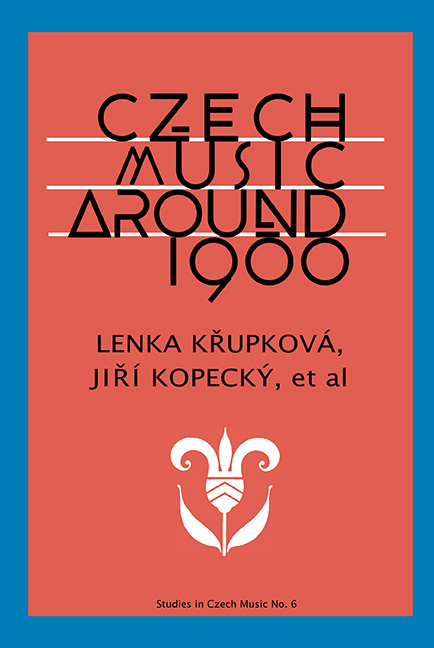Book contents
- Frontmatter
- Table of Contents
- Introductory Remarks on the Conception of This Book
- Flowers in the Graveyard, Tombstones in the Garden
- The “Other World” of Music at the Turn of the Century
- In the Footsteps of Tradition: The Spirit of Romanticism
- Czech Music at the Heart of European Music round 1900
- Novák as an Axial Figure in Czech Music
- Novák's Reception Abroad
- Josef Suk, Dvořák's Favorite Pupil
- Fibich's Path to Success in Prague's National Theater
- Tchaikovsky, Charpentier and the Formation of Janáček's Mature Operatic Style
- Josef Bohuslav Foerster's Lyrical Opera Eva and the Tradition of the French Drama lyrique
- Otakar Ostrčil and Mahler's Influence in Prague
- Folk Culture as an Outward Source of Artistic Inspiration: Vítězslav Novák the Tourist
- The Clash with Compositional Issues of European Music
- Index
- List of Illustrations
- About the Authors
- List of Sources Cited
Fibich's Path to Success in Prague's National Theater
from Czech Music at the Heart of European Music round 1900
- Frontmatter
- Table of Contents
- Introductory Remarks on the Conception of This Book
- Flowers in the Graveyard, Tombstones in the Garden
- The “Other World” of Music at the Turn of the Century
- In the Footsteps of Tradition: The Spirit of Romanticism
- Czech Music at the Heart of European Music round 1900
- Novák as an Axial Figure in Czech Music
- Novák's Reception Abroad
- Josef Suk, Dvořák's Favorite Pupil
- Fibich's Path to Success in Prague's National Theater
- Tchaikovsky, Charpentier and the Formation of Janáček's Mature Operatic Style
- Josef Bohuslav Foerster's Lyrical Opera Eva and the Tradition of the French Drama lyrique
- Otakar Ostrčil and Mahler's Influence in Prague
- Folk Culture as an Outward Source of Artistic Inspiration: Vítězslav Novák the Tourist
- The Clash with Compositional Issues of European Music
- Index
- List of Illustrations
- About the Authors
- List of Sources Cited
Summary
AN OVERRATED COMPOSER
The musical talent of Zdeněk Fibich (1850-1900) was recognized at an early age. His stimulating family background helped develop his versatile interests, and so it is not surprising that the fifteen-year-old composer started to write his first opera Bukovín to a text by the eminent librettist of operas by Bedřich Smetana, Karel Sabina. In the 1870s, when Czech society was divided by polemics over Wagnerianism and the importance of Smetana, Fibich took an unequivocal stand in Smetana's defense. Like Otakar Hostinský, he considered Smetana's works progressive, modern, and Czech. He was assured that Smetana's inspiration by the mature works of Franz Liszt and Richard Wagner did not jeopardize the “Czechness” of his musical art; on the contrary, familiarity with valuable music of foreign provenance could make Czech music more international. In his study “Wagnerianismus a česká národní opera” (Wagnerianism and Czech National Opera, 1870), which became a sort of manifesto for Smetana's circle, Hostinský writes: “Wagnerianism is not that cruel and horrible monster that swallows the national character of our (Czech) opera and poisons the entire musical world.”
Fibich was inclined toward the onnection of music with an extramusical program in the manner of the “New German” school; he was also interested in exceptional compositions in the field of musical theater (e.g. those of
Fibich was inclined toward the onnection of music with an extramusical program in the manner of the “New German” school; he was also interested in exceptional compositions in the field of musical theater (e.g. those of Mozart, Berlioz, and Wagner). He composed symphonic poems, and even his symphonies could not stand without programmatic commentary. His piano works showed some affinity with Schumann's poetic pieces, and a good part of his creative energy was devoted to stage works. He appeared to be Smetana's legitimate successor and his work was clearly overrated by Czech musicologists, especially by Hostinský and Nejedlý. The former was an influential aesthetician and, despite his decidedly positivist orientation, succumbed to the romantic cult of genius, being interested in groundbreaking figures in the history of music, “[…] not summarizers but pioneers [… like] Gluck, late Beethoven, Berlioz, Liszt and Wagner. Especially Wagner, with his music dramas, was the point to which all the previous musical development aesthetically gravitated.”
- Type
- Chapter
- Information
- Czech Music around 1900 , pp. 145 - 166Publisher: Boydell & BrewerPrint publication year: 2017
- 2
- Cited by

